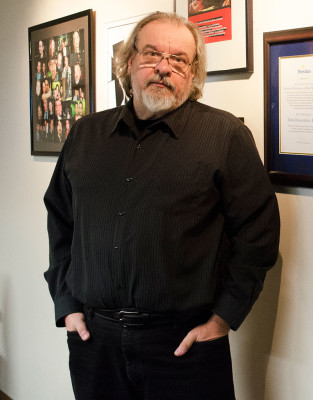Filmmaker leaving a legacy for students
BRITTANY PREOCANIN
In the beginning it smelled like a job, but like documentary filmmaking, teaching became more than just a job— it was a mission.
After a life spent looking through a viewfinder, extracting every element and its effects on visual composition, Vladimir Kabelik, 64, feels now is the perfect time to retire.
In regards to teaching Kabelik said, “I got really hooked because I started realizing that some of the students became young professionals. If they succeed then we feel we did a reasonable job and this is what life should be all about.”
Kabelik is a graduate of FAMU (Academy of Film and Television Arts) in his native Prague, has produced 23 documentaries, owns Willing Mind Productions Inc. and has spent half his life teaching at Sheridan College.
“Teaching means you are influencing people’s lives. I stopped worrying about how many hours a day or how many years in a life, or how much money. It really becomes meaningless,” said Kabelik.
“I did everything. I put a maximum into it.”
When he leaves teaching behind at the end of this school year, he will also leave behind a legacy for future students, the Vladimir Kabelik Excellence in Documentary Filmmaking Award.
“I want this award to maybe create a bridge to the industry experience. Only award originality and interesting production techniques. The moment you make it an obligatory, it looses the meaning,” he said.
Stephen Barden, co-ordinator of the Advanced Television and Film program, was once a student of Kabelik’s.
“At some point in the academic year, we will be able to dangle in front of a student, that you, in your pursuit of the documentary craft, could by vying for the Vlad Kabelik Award,” said Barden.
At best, mention of the award will hopefully have students asking who Vladimir Kabelik was, not just as a person, but what he stood for.
“I think he has enormous intellect and understanding of his chosen field,” said Jean Desormeaux, a professor in the Advanced Television and Film program.
Desormeaux has worked with Kabelik on a number of documentary films and for 15 years at Sheridan.
“His unique character has been forged from a tough life. He has seen what humanity can create and that is what has helped sculpt his creativity and also his approach to film,” said Desormeaux.
Kabelik left Czechoslovakia when the Soviets invaded in 1968, first going to Austria where he lived as a refugee with his wife Eva and two sons. In 1981, after living in Switzerland for a year, not knowing a word of English, he and his family moved to Canada.
But filmmaking continued to inspire him as he worked on CBC documentary projects for both the Nature of Things and Man Alive.
He was tireless in the pursuit of documentary filmmaking, specifically focusing on the arts; stories of musicians, journalists and photographers, to name a few.
He wrote, produced and directed documentary films, So Far from Home (2009), Stay Aubrey! (2014) and Beautifully Broken (2012).
In 2010, So Far from Home was nominated for a Gemini award in the Best Writing in Documentary Program or Series category.
Kabelik has had a major role in both documentary filmmaking and as a professor, where he is known to have high expectations for his students.
“He was the one teacher everyone wanted, but no one wanted to meet because he was so intimidating,” said Barden.
He recalls screening footage for Kabelik, terrified that it would be decimated.
“Vlad at the time was known and still to some extent is known as ‘Vlad the impaler,’” said Barden. “For me, he is a wise old man.”
Although he was tough on his students’ ideas, his teaching techniques allowed them to grow and develop tougher skin for when they entered the real world.
He will now joke about being a “soft old man,” but Kabelik still views documentary filmmaking as an art that doesn’t come easily.
“When people tell you, you are good, your parents, friends, classmates they are basically giving you the small or big B.S., but it’s not helping. From time to time somebody needs to tell you the plain truth,” said Kabelik.
Barden chuckled as he recalled Kabelik is famous for saying, “This is bullshit, go do it again.”
The idea is to push students further, challenge their ideas and make them better.
“How would you understand the value of victory, if you didn’t go through also realizing the value of defeat? Only then are you well-equipped for a real life competition,” said Kabelik.
“Looking back, every kick in my ass pushed me further.”
Professors at FAMU would give students back their marks with an attachment that included what they thought about the students’ attitudes, skills and prospect in the industry.
“Many of us valued these frank talks more than our official marks,” said Kabelik.
Although he feels like a broken record player, he teaches his students that life is full of pyramids. You have to stay at the top, but every three years you are pushed back down to the bottom.
“You have to keep fighting all the way through,” said Kabelik.
As a fiercely loyal filmmaker and constant educator, he has tried to provide a bridge for students after graduation by having them involved in his films, allowing them to collaborate in a film environment.
“It is a passion what we do. In a way the work for students is as important to us because it is a reflection of tradition and our own beliefs,” said Desormeaux.
However, one of Kabelik’s biggest struggles was to make his students realize how fortunate they are to have people from the industry at their fingertips.
The film faculty has a number of professors from the filmmaking industry available for students to speak with and learn from.
“I feel privileged, honestly, because it is hard to get a face to face appointment with these industry sharks,” said Kabelik.
He stretches out his arms at the desk in the boardroom of S303. “Well, they are all sitting here and the students are in the hallway. They can see and talk to them, but they just leave the room.”
Some students acknowledged having professional filmmakers on staff and they used that privilege to make it in the industry.
Former student Mark de Valk contacted Kabelik 15 years ago to invite him to an advanced screening of his first feature film in Toronto. His one request was that Kabelik show up with the pad of paper and pencil he always had in class, to rip his work apart and make the film better.
“I remember coming in as an old teacher, now friend, and I did what he asked me to and that somehow established a new level,” said Kabelik.
Once a student, then friend and now colleague working together at Sheridan and on films, Barden values Kabelik’s knowledge and opinion.
“He is a man who I know as being so gentle and so artistic on the interior. He just has that gruff, eastern European exterior that is intimidating to so many people.
“I cherish the sense of loyalty and dedication to both his craft and his students.”
An online donation to the Vladimir Kabelik Excellence in Documentary Filmmaking award can be made at giving.sheridancollege.ca. Contact Denise Lach as 905-815-4299 or denise.lach@sheridancolleg.ca for more information.





